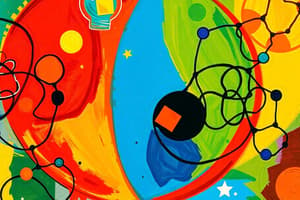Podcast
Questions and Answers
What is the primary goal of basic research in science?
What is the primary goal of basic research in science?
- To assess science concepts in earth science education
- To solve practical problems
- To develop general-purpose Earth and environmental science ontologies
- To expand scientific knowledge without regard to practical applications (correct)
What is the role of the teacher in guiding scientific inquiry in early childhood education?
What is the role of the teacher in guiding scientific inquiry in early childhood education?
- To develop general-purpose Earth and environmental science ontologies
- To assess science concepts in earth science education
- To organize experiences and look for patterns and relationships (correct)
- To provide advance organizers and background experiences
What is a characteristic of applied research in science?
What is a characteristic of applied research in science?
- It aims to solve practical problems (correct)
- It is primarily conducted in the classroom
- It is used to develop general-purpose Earth and environmental science ontologies
- It is concerned with the formulation of theories
What is an example of a teaching medium used in earth science education?
What is an example of a teaching medium used in earth science education?
What is the purpose of the Synthetic Aperture Radar Science Data Processing Foundry Concept for Earth Science?
What is the purpose of the Synthetic Aperture Radar Science Data Processing Foundry Concept for Earth Science?
What is the primary purpose of the scientific method?
What is the primary purpose of the scientific method?
What is a key ability in science education, as outlined by the National Research Council's 6 Science Content Standards?
What is a key ability in science education, as outlined by the National Research Council's 6 Science Content Standards?
What is a key component of designing and conducting a scientific investigation?
What is a key component of designing and conducting a scientific investigation?
What is the purpose of using tools and techniques to gather, analyze, and interpret data?
What is the purpose of using tools and techniques to gather, analyze, and interpret data?
What is a characteristic of the scientific method?
What is a characteristic of the scientific method?
Study Notes
Scientific Method and Its Importance in Science Education
The scientific method is a fundamental component of scientific inquiry and serves as the foundation for how scientists approach and solve problems. It is a systematic and logical process for acquiring knowledge about the natural world through observation, experimentation, and data analysis. The scientific method is not a rigid set of rules, but rather a flexible framework that allows for the refinement and expansion of scientific knowledge over time.
Key Abilities and Concepts in Science Education
The National Research Council's 6 Science Content Standards outline the fundamental abilities and concepts that underlie scientific inquiry. These include:
- Identifying questions that can be answered through scientific investigations: Students should develop the ability to refine and direct questions toward scientific understanding.
- Designing and conducting a scientific investigation: Students should learn general abilities such as systematic observation, making accurate measurements, and identifying and controlling variables.
- Using appropriate tools and techniques to gather, analyze, and interpret data: Students should be able to access, gather, store, retrieve, and organize data using hardware and software designed for these purposes.
- Developing descriptions, explanations, predictions, and models using evidence: Students should base their explanations on observations and develop cognitive skills to differentiate explanation from description.
Guiding Scientific Inquiry in Early Childhood Education
In early childhood education, scientific inquiry is guided by the teacher's understanding of the underlying science concepts, which are used to organize experiences and look for patterns and relationships. This structure is not rigid and allows for the emergence of new questions and ideas.
Basic and Applied Research in Science
Basic research is aimed at expanding scientific knowledge without regard to practical applications and is primarily concerned with the formulation of theories or contributing to the existing body of knowledge. Applied research, on the other hand, aims to solve practical problems and is often conducted in the classroom to determine how general laws of learning operate in real-world settings.
Assessing Science Concepts in Earth Science Education
Assessing science concepts in earth science education can be done through various methods, such as examining the agreement between science textbooks and scholars in earth science relative to earth science concepts. Studies have also been conducted to determine the effects of advance organizers and background experiences on the attainment of science concepts in earth science.
Earth Science Concepts and Syllabus
A science syllabus for middle and junior high schools in earth science may include topics such as the earth's surface, rock formations, and earth history. This syllabus typically includes objectives and performance criteria for understanding these concepts.
Earth Science Teaching Medium: Snow
Snow can be used as a teaching medium in earth science to explore scientific concepts such as crystal growth, melting, sedimentation, and metamorphism. Snow can be considered a mineral, sediment, sedimentary rock, or metamorphic rock, providing a practical and accessible way to study natural processes.
Synthetic Aperture Radar Science Data Processing Foundry Concept for Earth Science
The Synthetic Aperture Radar Science Data Processing Foundry Concept for Earth Science aims to develop general-purpose Earth and environmental science ontologies by representing concepts and relationships that span usage across multiple disciplines and scientific specialties. This approach expands coverage and discloses relationships among concepts in the Earth sciences, which is essential for scientific discovery and re-use of information resources.
In conclusion, the scientific method is a crucial aspect of scientific inquiry and education. It provides a framework for acquiring knowledge about the natural world through observation, experimentation, and data analysis. By understanding and applying the scientific method, students can develop the necessary skills to engage in active scientific inquiry and contribute to the advancement of scientific knowledge.
Studying That Suits You
Use AI to generate personalized quizzes and flashcards to suit your learning preferences.
Description
Explore the significance of the scientific method in scientific inquiry and education, understanding key concepts in science education, guiding scientific inquiry in early childhood education, basic and applied research in science, assessing science concepts in earth science education, and more.




